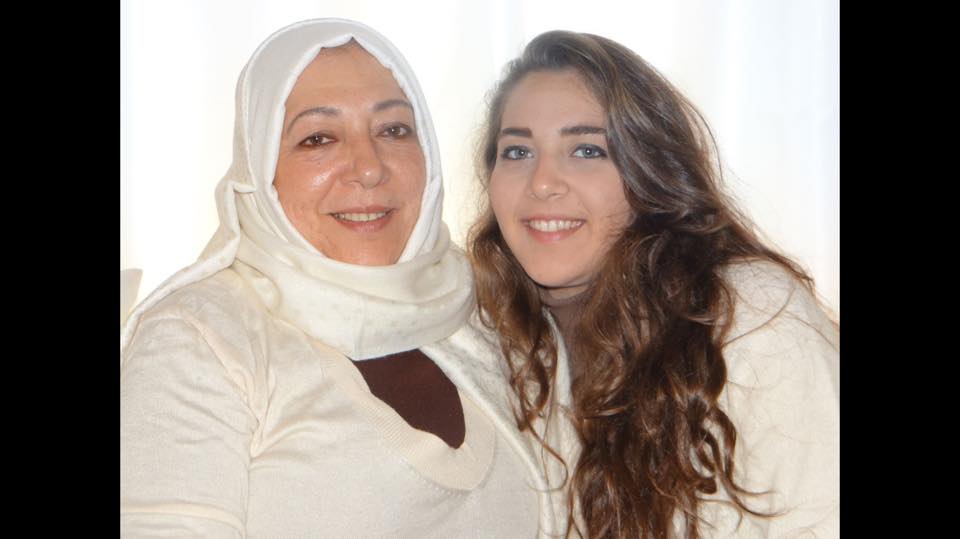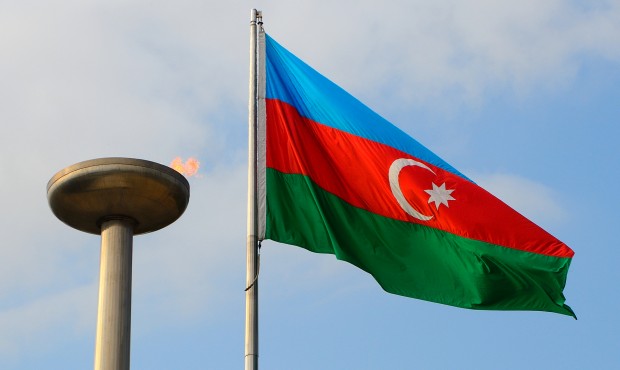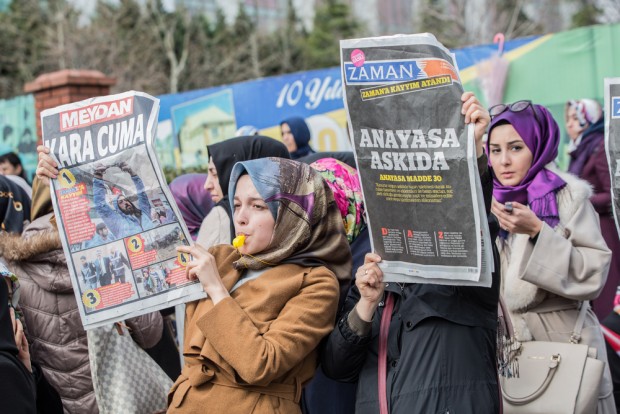22 Sep 2017 | Campaigns -- Featured, Statements, Syria, Turkey, Turkey Statements
[vc_row][vc_column][vc_column_text]

Syrian journalists Orouba Barakat and her daughter Halla Barakat were found murdered in Istanbul. (Facebook)
The bodies of Syrian journalists Orouba Barakat and her daughter Halla Barakat were discovered in their apartment in Istanbul late Thursday 22 September, 2017.
Friends who failed to reach Halla Barakat by phone called the police, who had a locksmith open the apartment located on Yangaç Street in the Üsküdar neighbourhood.
According to police reports, the Barakats were strangled and then stabbed. The perpetrators also poured detergent powder on the bodies to minimise the smell of the decomposing bodies.
“The brutal killing of Orouba and Halla is a tragedy for press freedom.” Hannah Machlin, project manager, Mapping Media Freedom, said. “As we mourn the loss of two brave journalists, we call on the authorities to swiftly investigate and identify those responsible for this heinous crime.”
Orouba Barakat was a journalist, filmmaker and activist who was an outspoken critic of the Assad regime and a staunch supporter of the revolution. She had exposed countless atrocities of the Assad regime in prisons.
Her daughter Halla (22) was a reporter for Alekhbarya TV, news editor for the Orient and former editor at Turkish state channel TRT world.
Both Barakat and her daughter had been reportedly receiving threats from groups associated with the Bashar Assad government.
Orouba Barakat was forced to spend most of her life in exile. She fled her native Syria in the 1980s. She resided in the UAE before moving to Istanbul.
The police are still investigating the murder. The date of the murder is not yet known.[/vc_column_text][/vc_column][/vc_row][vc_row][vc_column][vc_separator][vc_custom_heading text=”Media freedom is under threat worldwide. Journalists are threatened, jailed and even killed simply for doing their job.” font_container=”tag:h3|text_align:left” use_theme_fonts=”yes” link=”url:https%3A%2F%2Fwww.indexoncensorship.org%2Fcampaigns%2Fpress-regulation%2F|||”][vc_row_inner][vc_column_inner width=”1/2″][vc_column_text]Index on Censorship monitors media freedom in Turkey and 41 other European area nations.
As of 22/9/2017, there were 525 verified violations of press freedom associated with Turkey in the Mapping Media Freedom database.[/vc_column_text][/vc_column_inner][vc_column_inner width=”1/2″][vc_column_text]Index on Censorship campaigns against laws that stifle journalists’ work. We also publish an award-winning magazine featuring work by and about censored journalists. Support our work today.[/vc_column_text][/vc_column_inner][/vc_row_inner][vc_separator][/vc_column][/vc_row][vc_row][vc_column][vc_basic_grid post_type=”post” max_items=”12″ style=”load-more” items_per_page=”4″ element_width=”6″ grid_id=”vc_gid:1506088588004-59d922a2-300c-5″ taxonomies=”55″][/vc_column][/vc_row]
22 Sep 2017 | Azerbaijan, Azerbaijan News, Mapping Media Freedom, media freedom featured, News and features
[vc_row][vc_column][vc_column_text]
The government of Azerbaijan is waging a war on independent journalism within the country.
“This has been the case for years now,” says Arzu Geybulla, Index on Censorship’s Mapping Media Freedom correspondent for Azerbaijan. “Most of the journalists, editors, bloggers who are behind bars are there on bogus charges of hooliganism, tax evasion, slander, abuse of power, illegal entrepreneurship.”
The government has recently taken two of its cases internationally for the first time. This may change the way international reporters critical of Azerbaijan’s government cover the country in their own media.
Thorbjørn Jagland, the secretary general of the Council of Europe, has called on the authorities in the country “to respect the spirit of the country’s cooperation with the Council of Europe and to fully abide by its commitments under the European Convention on Human Rights in order to avoid yet another case of unjust deprivation of liberty which has no place in a democratic society”.
Here are some of the new cases and developments in the past month where Azerbaijani officials target the media domestically and abroad.
10 September, 2017 ‒ The regional reporter for opposition Azadliq newspaper Ziya Asadli was given a three-year sentence by a Bilasuvar region court after being charged with hooliganism.
In April 2017 Asadli reported that he was approached and pressured by police after reporting on local protests. After publishing these pieces, authorities accused Asadli of engaging in hooliganism at a local tea house.
During the incident at the tea house, he notified the police and learned that there was a complaint against him. He is denying these accusations, explaining that it was he who was attacked.
Azadliq Radio is the Azerbaijani service for Radio Free Europe/Radio Liberty.
5 September, 2017 ‒ French journalists Elise Lucet and Laurent Richard are being sued for defamation by the government of Azerbaijan. The two journalists are facing these charges after describing Azerbaijan as a dictatorship.
“This is the first time our government has engaged in an action of this kind and while it is hard to make any concrete projections, I suspect this may set the tone for future international reporters critical of the authorities and the language they use,” Geybulla said. “Clearly the authorities in Baku are very sensitive to the kind of language used describing them in international coverage.
A French court will make a ruling on 7 November 2017.[/vc_column_text][/vc_column][/vc_row][vc_row][vc_column][vc_separator][vc_custom_heading text=”Media freedom is under threat worldwide. Journalists are threatened, jailed and even killed simply for doing their job.” font_container=”tag:h3|text_align:left” use_theme_fonts=”yes” link=”url:https%3A%2F%2Fwww.indexoncensorship.org%2Fcampaigns%2Fpress-regulation%2F|||”][vc_row_inner][vc_column_inner width=”1/2″][vc_column_text]Index on Censorship monitors media freedom in Azerbaijan and 41 other European area nations.
As of 21/9/2017, there were 70 verified violations of press freedom associated with Azerbaijan in the Mapping Media Freedom database.[/vc_column_text][/vc_column_inner][vc_column_inner width=”1/2″][vc_column_text]Index on Censorship campaigns against laws that stifle journalists’ work. We also publish an award-winning magazine featuring work by and about censored journalists. Support our work today.[/vc_column_text][/vc_column_inner][/vc_row_inner][vc_separator][/vc_column][/vc_row][vc_row][vc_column][vc_column_text]
11 September, 2017 ‒ Russian-Israeli blogger Alexander Lapshin was released by authorities following a pardon for Azerbaijan President Aliyev.
Lapshin is a Moscow-based writer of a Russian-language travel blog and was wanted in Azerbaijan both for visiting the disputed region of Nagorno-Karabakh and for criticising Azerbaijani policies.
On 15 December 2016, Lapshin was detained in Minsk on an extradition request from Azerbaijan.
On 20 January 2017, the General Prosecutor’s Office of Belarus ruled to extradite Lapshin. One week later, his lawyer made an appeal to the Higher Court of Belarus. If extradited, the criminal case filed in Azerbaijan, if convicted, can lead to a prison sentence from five to eight years.
According to the Azadliq Radio, Lapshin attempted to commit suicide a day before his pardon fearing the extension of his extradition case. The pardoning means that his three-year sentence was commuted by the authorities.
Lapshin holds Russian, Ukrainian and Israeli citizenship, and will instead be extradited back to Israel.
11 September, 2017 ‒ A court has freed Mehman Aliyev, the director of independent news agency Turan, from pretrial detention and has now been placed under a conditional release.
On 24 August 2017 Aliyev was detained by Azerbaijani authorities on tax evasion charges. It was reported by Azadliq Radio that the next day he was sentenced to three months in pretrial detention. It was also reported that Aliyev was questioned for eight hours the day before his detention.
Aliyev has also been charged with carrying out “illegal entrepreneurship activities” which carries with it at least seven years sentence. He now faces three charges in total.
“The Council of Europe is working closely with the authorities in Azerbaijan on reforms intended to soften the punishment system and avoid unnecessarily harsh sentences and detentions whenever possible – for instance, in cases when the person who is detained does not threaten the security of the state or its citizens,” announced Secretary General of the Council of Europe Thorbjørn Jagland the day after the arrest. “These changes are a part of a presidential initiative that Azerbaijani officials recently reported to the Committee of Ministers as being on the point of adoption.”
Aliyev’s news agency Turan announced that it will be suspending its work temporarily. The tax probe launched against the agency resulted in the closing of its bank accounts, which has led to its forced temporary closure. On 15 September 2017 the official tax evasion charges were dropped, but the company’s bank accounts remain frozen.
The conditional release states that Aliyev is responsible for checking in regularly to the police and notifying them if he leaves the city of Baku.
In an interview with Azadliq Radio, Aliyev’s lawyer Fuad Agayev stated that there has been no changes to the charges brought against his client.[/vc_column_text][/vc_column][/vc_row][vc_row][vc_column][vc_basic_grid post_type=”post” max_items=”4″ element_width=”6″ grid_id=”vc_gid:1506001163566-c20aafba-9c85-8″ taxonomies=”6564″][/vc_column][/vc_row]
21 Sep 2017 | Mapping Media Freedom, Media Freedom, media freedom featured, News and features, Turkey, Turkey Uncensored
[vc_row][vc_column][vc_column_text]

People gather in solidarity outside Zaman newspaper in Istanbul in March 2016
When the 15 July 2016 putschists attempted a coup in Turkey, no one could foresee that the journalists, columnists and staff of opposition newspapers and TV channels would be the target of such a massive detention and arrest campaign by the authorities.
However, days after the coup was halted, a large number of reporters, authors and staff of Zaman Daily, which is linked to the Gülen movement, led by the USA-based cleric Fethullah Gülen, were accused of orchestrating the failed coup. The arrests began immediately.
Journalists Ali Bulaç, Şahin Alpay, Mümtaz’er Türköne, Ahmet Turan Alkan, Mustafa Ünal and others were put in jail based on their articles, written on 17 December 2013. After the paper reported on a corruption scandal, in which then-key government members were involved, the prosecution claimed these writers were “part of an organised attempt against the government”. Based on their articles, the prosecution forged a link between the coup attempt and the journalists. “Attempting to abolish the Constitution, and membership to a terrorist group” are very common charges levelled against dissident journalists and intellectuals. In brief, the main motivation of such cases, a fashion among the judiciary, is to make these people look like “putschists”.
The 64-page indictment, which was prepared 300 days after the arrests, an unlawful detention period, consisted of only the titles of the articles, which were the only evidence provided to support the accusations. Not a single word of the content from the articles was used.
Four-hundred-and-twenty days on from the arrests, some of the journalists finally appeared before the court and made their defence. They stand trial at a courtroom close to notorious Silivri Prison where they are also being held. Despite objections from all the journalists, the court ruled at the end of the two-day hearing to continue their detention.
Bulaç, a vigorous advocate of Islamist ideology within Turkey, took to the floor to give his defence. Following a brief introduction, he talked about his frustration with the Gülen movement. He said he believes in his that elements of the movement were involved in the attempted coup.
Bulaç highlighted that he was subjected to ill-treatment during the police interrogation, including being mocked. He stated that such humiliation continued while in prison. He made clear in his defence that the religious group, which was once known for its services for people, evolved into “FETÖ”, a term coined by Turkey’s AKP government, meaning “a terrorist group supporting Fethullah Gülen”.
The most striking part of his defence was when Bulaç said he regretted writing for Zaman. He then asked the politicians who once supported the movement and later on separated: “You tell the public that they were deceived by the movement. But I was also deceived. So what makes a difference between you and me?”
Having expressed his objections to the evidence against him, Bulaç reiterated that none of his actions could be considered to be terrorist acts.
“Did I give the orders to stage a coup? Did I take part in pre-coup meetings? Did I bomb those innocent people who were killed on that night by jet fighters? Did I launder money on behalf of the group? Did I illegally transfer money abroad? Did I had relation with the police and military officers who actively took part in the process? No, none. So how can I be labelled as the member of the organization?” Bulaç asked.
Another well-known Zaman journalist, Alpay, is 73-years-old with multiple health conditions, including high blood pressure, prostate and heart conditions, loss of hearing and difficulty in breathing, among others. As a result, he has required medical treatment while in prison.
All defendants in the case face three times aggravated life sentences plus 15 years in jail. Alpay questions how his articles could merit such an extreme prison term. He argues that the evidence against him is nonsense.
As to why he wrote for Zaman rather than other media outlets, Alpay said the daily was the only one which opened its doors to him and that it pursued a policy of reaching out to all parts of the society by inviting various authors with different political backgrounds.
“The movement was a vigorous supporter of Turkey’s European Union membership bid. However, I was disappointed with the movement after I realised it had a dark side. I am extremely regretful for writing for Zaman,” Alpay added.
Alpay believes he will be acquitted of all charges against him and asked the panel of judges to release him pending trial so that he could spend the rest of his life with his children and grandchildren.
The story of İbrahim Karayeğen, who was the night editor of Zaman, is a little different from the other defendants. After he was detained in July 2016, his relatives hadn’t heard from him for eight days and the lawyer representing him said that Karayeğen faced torture. His lawyer was later arrested and sent to prison.
In his court defence, Karayeğen said that he was beaten by prison guards in the corners of the Silivri Prison where no surveillance camera exist. He shouted “justice doesn’t exist” during one of these assaults. He was held in a solitary confinement for six-and-a-half months.
Although he didn’t write a single article for the daily, the prosecution charged him with writing articles supporting the coup attempt. Karayeğen underscored that he didn’t write columns for Zaman during his working life in the daily. Explaining that he had no authority to determine the daily’s editorial policy, Karayeğen asked for his release. But his hopes also faded as the court decided for the opposite.
The next hearing is on 8 December, where a decision will be made whether Alpay’s health is an obstacle to his being held in prison. [/vc_column_text][/vc_column][/vc_row][vc_row][vc_column][vc_basic_grid post_type=”post” max_items=”12″ style=”load-more” items_per_page=”4″ element_width=”6″ grid_id=”vc_gid:1505985230960-9d055fa4-4d52-5″ taxonomies=”4335, 8607″][/vc_column][/vc_row]
20 Sep 2017 | Events
[vc_row][vc_column][vc_single_image image=”95224″ img_size=”full” alignment=”center”][vc_column_text]Over the past few years, the news has been replete with stories about how authors, thought-leaders and others have become disinvited or pressured to withdraw from university speaking engagements because they don’t promote prevailing ideology. What are the consequences of disallowing diverse viewpoints on campus and what can speakers, faculty and librarians do to support intellectual freedom in academia?
Join the American Library Association’s Office for Intellectual Freedom, SAGE Publishing and Index on Censorship for a webinar on speaker disinvitation during Banned Books Week. It will include perspectives from Mark Osler, a professor who was disinvited from a campus speaking engagement, Glenn Geher, a professor of psychology who helped to bring a controversial speaker to campus, and Judith C. Russell, a dean of libraries who addresses issues relating to controversial speakers, academic freedom and campus safety on campus.
The event will be chaired by Jemimah Steinfeld, deputy editor of Index on Censorship magazine. This event is part of #BannedBooksWeek[/vc_column_text][vc_row_inner][vc_column_inner width=”1/3″][vc_single_image image=”95736″ img_size=”full”][vc_column_text]
Judith C. Russell
[/vc_column_text][/vc_column_inner][vc_column_inner width=”1/3″][vc_single_image image=”95735″ img_size=”full”][vc_column_text]
Glenn Geher
[/vc_column_text][/vc_column_inner][vc_column_inner width=”1/3″][vc_single_image image=”95734″ img_size=”full”][vc_column_text]
Mark Osler
[/vc_column_text][/vc_column_inner][/vc_row_inner][vc_row_inner][vc_column_inner width=”1/3″][vc_single_image image=”88892″ img_size=”full”][vc_column_text]
Jemimah Steinfeld
[/vc_column_text][/vc_column_inner][/vc_row_inner][/vc_column][/vc_row][vc_row][vc_column][vc_column_text]
[/vc_column_text][/vc_column][/vc_row]



